|
|
|
Sort Order |
|
|
|
Items / Page
|
|
|
|
|
|
|
| Srl | Item |
| 1 |
ID:
184309
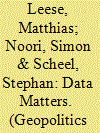

|
|
|
|
|
| Summary/Abstract |
Data matter more than ever in the regulation of borders and migration. An apt illustration of how movement is enabled or restricted by data collection and analytics was recently reported by Eyal Weizman, founding director of the London-based research agency Forensic Architecture that specialises in the production and analysis of evidence about human rights violations by state and corporate actors. Prior to a business trip to Miami where he was supposed to open Forensic Architecture’s first major exhibition in the US that, among other things, displayed investigations into a CIA drone strike in Pakistan and police killings of black US citizens, Weizmann was notified that his visa waiver request had been denied and that he would not be allowed to enter the United States.
|
|
|
|
|
|
|
|
|
|
|
|
|
|
|
|
| 2 |
ID:
193301
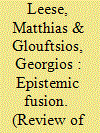

|
|
|
|
|
| Summary/Abstract |
This article focuses on the control of international mobility through the gathering, processing, and sharing of air travellers’ data. While a lot has been written about pre-emptive rationalities of security translated into the functionalities of IT systems used for border controls, we take a step further and investigate how these rationalities are operationalised through data transfer, screening, validation, discarding, profiling, contextualisation, calibration, and adjustment practices. These practices may seem banal and technical; however, we demonstrate how they matter politically as they underpin the making of international security. We do so by analysing the work of Passenger Information Units (PIUs) and retracing how they turn Passenger Name Record (PNR) data into actionable intelligence for counterterrorism and the fight against serious crime. To better understand the work of PIUs, we introduce and unpack the concept of ‘epistemic fusion’. This explicates how security intelligence comes into being through practices that pertain to cross-domain data frictions, the contextualisation of data-driven knowledge through its synthesis with more traditional forms of investigatory knowledge and expertise, and the adjustment of the intelligence produced to make it actionable on the ground.
|
|
|
|
|
|
|
|
|
|
|
|
|
|
|
|
| 3 |
ID:
184314
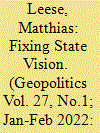

|
|
|
|
|
| Summary/Abstract |
Building on Scott’s notion of identity as a key concept in early modern statehood, this paper historically contextualises and analyses the current political re-problematisation of identity in the EU. Engaging the recently adopted interoperability initiative that is set to biometrically verify and cross-validate identity records between all European border management, migration, and security databases, it argues that interoperability presents a shift from traditional modes of identity production at the border towards a digital space of identity management. Such identity management is predicated on the establishment of a biometric super-layer structure that cuts across databases without dissolving their legal foundations and introduces a new mode of ‘truth’ production in the form of a dedicated ‘identity confirmation file’ that is supposed to re-introduce a reliable baseline for the government of the Schengen area.
|
|
|
|
|
|
|
|
|
|
|
|
|
|
|
|
| 4 |
ID:
137614
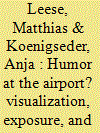

|
|
|
|
|
| Summary/Abstract |
With the emergence of aviation as a target for terrorism and serious crime in the 1970s, the affective dimension of airport security changed drastically and is now carefully engineered as a zone of earnest and solemn protocol. Against a backdrop of bombings and hijackings, airport security today enacts a “no bullshit” approach to the “war on terror.” Humor has essentially been banned from screening operations. From signs reading “No bomb jokes, please,” to drastic consequences in the case of non-compliance, security appears as something that is not to be fooled around with. Against this background, this paper builds on ethnographic fieldwork at Hamburg airport during the German trial run with body scanners in 2011. During the time of observation, we found a surprising amount of reciprocal laughter and joking. We argue that this can be conceptualized as an attempt to break open a space for laughter, momentarily abandoning protocol in order to deal with issues of visualization, exposure, and shame which arise from the new focus on the fleshly anatomical body.
|
|
|
|
|
|
|
|
|
|
|
|
|
|
|
|
| 5 |
ID:
134477


|
|
|
|
|
| Summary/Abstract |
This article argues that with increasingly large databases and computational power, profiling as a key part of security governance is experiencing major changes. Targeting mobile populations in order to enact security via controlling and sifting the good from the bad, profiling techniques accumulate and process personal data. However, as advanced algorithmic analytics enable authorities to make sense of unprecedented amounts of information and derive patterns in a data-driven fashion, the procedures that bring risk into being increasingly differ from those of traditional profiling. While several scholars have dealt with the consequences of black-boxed and invisible algorithmic analytics in terms of privacy and data protection, this article engages the effects of knowledge-generating algorithms on anti-discriminatory safeguards. Using the European-level efforts for the establishment of a Passenger Name Record (PNR) system as an example, and on the theoretical level connecting distinct modes of profiling with Foucauldian thought on governing, the article finds that with pattern-based categorizations in data-driven profiling, safeguards such as the Charter of Fundamental Rights of the European Union or the EU data-protection framework essentially lose their applicability, leading to a diminishing role of the tools of the anti-discrimination framework.
|
|
|
|
|
|
|
|
|
|
|
|
|
|
|
|
| 6 |
ID:
164286
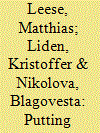

|
|
|
|
|
| Summary/Abstract |
In this article, we examine the possibility of exercising critique through the mandatory ethical coverage that EU security research projects must be subjected to. Applied ethics, so we argue, speaks to several core issues in the critical security studies agenda, such as turning abstract considerations of critique into forms of tangible cooperation, engaging exoteric communities, and placing normative questions about security within concrete contexts of its imagination and production. Accordingly, it can be seen as a concrete way of putting critique to work. At the same time, however, applied ethics does face considerable challenges that result from its location in the middle of numerous cross-pressures, such as political ambitions, economic interests, technological rationales and the demands of security professionals. These challenges risk turning what was intended to be the critical corrective of applied ethics into a legitimizing function of mere ‘ethics approval’. Drawing on personal experiences as well as debates on critical security studies and ethics, we discuss some of these challenges and discuss the possibility of and conditions for critique within the arena of EU security research.
|
|
|
|
|
|
|
|
|
|
|
|
|
|
|
|
|
|
|
|
|